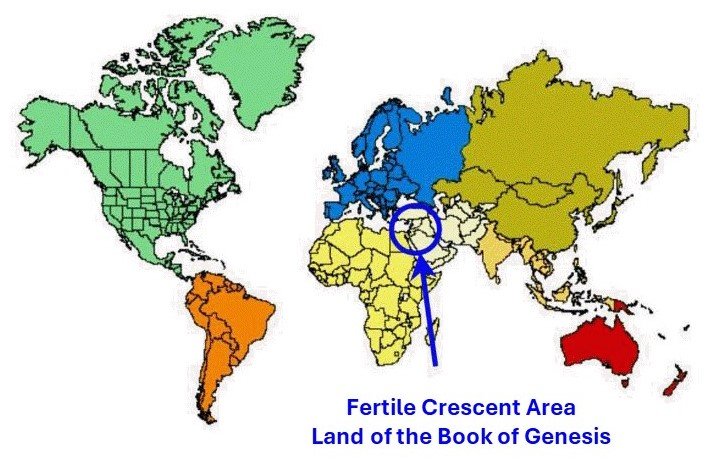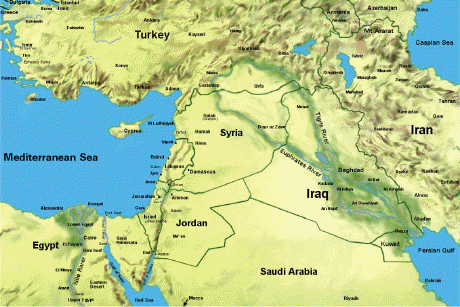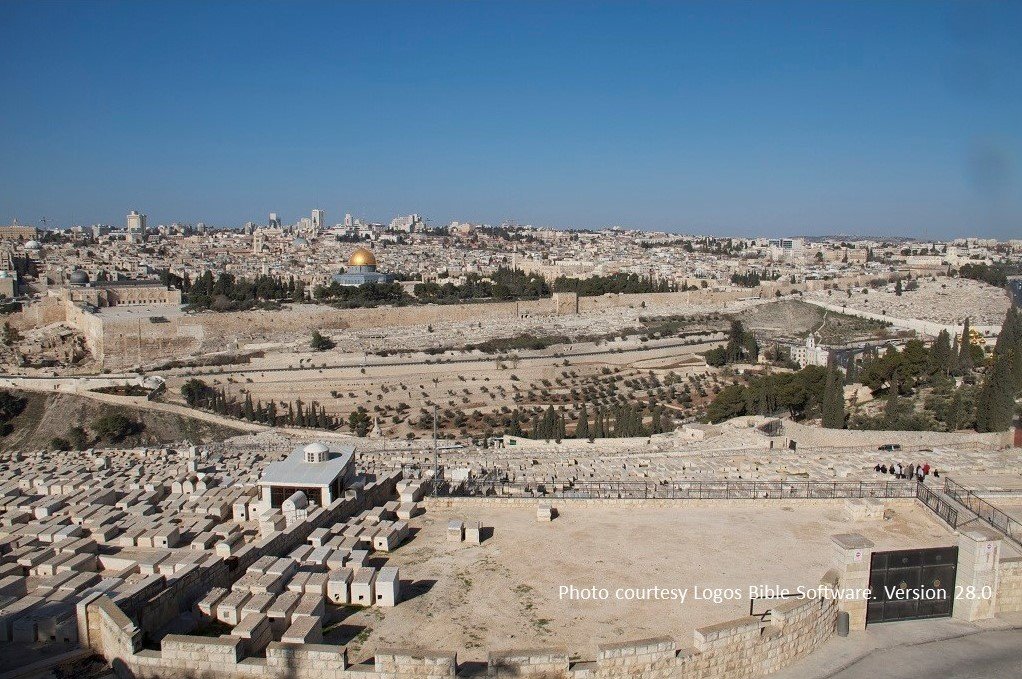For our first Bible study series we plan to examine the beginnings of the New Testament church through a detailed study of the book of Acts and related letters written by the apostle Paul. Before jumping into this series, however, let’s first get ourselves grounded by considering the times and culture in which the events we will study took place. New Testament Israel looked a lot different than the world we’re used to today. Our studies will have more meaning if we first take a little time to appreciate the historical and cultural background of God’s chosen nation.
For this first introductory study, let’s take a bird’s eye view of the history of the Jewish nation from its inception until the time of the Judges. As we consider the history of this nation, it’s almost impossible not to notice the power of God at work directing the course of human events.
The American Heritage Dictionary [Note 1] defines sovereignty as
- Supremacy of authority or rule as exercised by a sovereign or sovereign state
- Royal rank, authority, or power.
Interwoven throughout the scriptures is the concept of the sovereignty of God. This idea says that God is in absolute control and that God has the ultimate authority to do whatever he sees fit to do. As we survey the history of the Jewish nation, keep watch for signs of the sovereignty of God at work as he directs the drama of human history!
Note: Throughout this and future studies you will find references to Jews, Hebrews, the nation of Israel, etc. As a point of clarification, Jews and Hebrews are two different words used to describe the same group of people – those people descended directly from Abraham (of the Old Testament book of Genesis). These descendants eventually became numerous enough to form a nation. Together, these people are alternatively referred to as Israelites, Israel, the nation of Israel, the Jewish nation, etc.
The Patriarchal Period: 2200 – 1600 B.C.
The Book of Genesis is where we find recorded the patriarchal period of the Jewish nation. After briefly reviewing creation, the beginning of sin, the Flood, and the subsequent spread of mankind across the earth, Genesis focuses on God’s sovereign choice of a particular nation as his vehicle for communicating to the world.
The history of the Jewish people begins with Abraham approximately 2200 years before the birth of Jesus. Abraham is the first person in the Bible to be referred to as a Hebrew (or Jew). Both secular world history and Biblical history tell us that the earliest signs of mankind trace back to an area known as the “Fertile Crescent”.

This area, in what is now known as the Middle East, stretched from the Nile Valley to the Tigris and Euphrates Rivers and included parts of present-day Syria, Lebanon, Jordan, Israel, Iraq, Kuwait, etc. Essentially all of both Old and New Testament scripture is set in this geographical location and it is from here that the Jewish people emerged.
In Genesis chapter 12, we find a man named Abram living in a place called Ur of the Chaldeans. (It is believed that this city was located on the Euphrates River in what is now southern Iraq.) Here we are told that God spoke directly to Abram and told him to leave his home and to go to “the land of Canaan”. (Canaan was the name used at that time for what is now the country of Israel. This general area, located along the east coast of the Mediterranean Sea, is also sometimes referred to as Palestine.) God promised to give Abram (whom he later renamed Abraham) and his descendants the land of Canaan as their home. God also said that Abraham’s descendents would become a great nation and that through him the whole world would be blessed. (Indeed, as noted above, Abraham’s descendants eventually became the nation of Israel fulfilling God’s first promise. The second promise was fulfilled when Jesus Christ, humanly-speaking a descendant of Abraham, blessed the whole world by sacrificing his life to make possible the forgiveness of sins.)

We are told in Genesis that Abraham was the father of Isaac who, in turn, became the father of Jacob. Jacob eventually became the father of twelve sons from whom eventually descended the twelve tribes of Israel. (Late in his life, Jacob was given the new name “Israel” by God himself. Hence, the name Israel originally referred to an individual man. Later, the name was applied to all of his descendants collectively as “the nation of Israel”.) Together, Abraham, Isaac, and Jacob are often referred to as the Patriarchs of Israel since the family lines of the nation of Israel trace back to them. (A patriarch is the head of a family, tribe, or clan.)
Most of the book of Genesis records the history of these first three generations of the Jewish people. It is here we find many of the better-known Biblical accounts, including:
- The Destruction of Sodom and Gomorrah
- Abraham’s almost-sacrifice of his son Isaac on Mount Moriah
- Joseph’s “Coat of Many Colors”
- Joseph and Potiphar’s Wife
Genesis’ historical account concludes around 1600 B.C. in the land of Egypt. There we find the Jewish nation, having been relocated from Canaan to that country, living prosperously under the able leadership of Joseph, Jacob’s son. This temporary relocation to a nation of great wealth was God’s way of providing for his people during the formational period of their nation and, as we will see, set the stage for the emergence of Israel as a people clearly set apart by God.
Egypt, Exodus, Conquest and Judges: 1600 – 1050 B.C.
This period of Israel’s history is recorded in the books of Exodus, Leviticus, Numbers, Deuteronomy, Joshua, Judges, and the first part of I Samuel. (The book of Ruth represents a break from the historical narrative of the surrounding books. It gives us a glimpse into the private lives of certain individuals during the period of the Judges.)
Exodus begins where Genesis ends – with the people of Israel thriving and growing in the land of Egypt. However, over the course of time things began to change and the Egyptians began to grow afraid of the obvious success of the Hebrews. Eventually, after generations came and went, the Hebrews found themselves subjected to slavery under the harsh rule of the Egyptians. The Jews lived in Egypt a total of 430 years until finally, in approximately 1450 B.C., God sent Moses to lead the Jews out of slavery and back to the land he had promised Abraham so many years before. The king of Egypt (called Pharaoh), however, did not want to let the Jews leave. So God sent a series of incredible plagues upon the land so severe that in the end Pharaoh had no choice but to let the Jews go. In fact, God’s display of power on behalf of Israel was so great that not only did the Egyptians allow the Jews to leave, they even gave them gold, silver, and clothing to hurry them out! Loaded down with the riches of Egypt, Israel departed in a grand celebration which has come to be known as the Exodus. (The word “exodus” means a departure of a large number of people.)

Even though the Jews saw God perform incredible miracles on their behalf in Egypt, they still tended to go their own way and disobey God. As a result, instead of marching straight from Egypt back to the land God had promised them (a distance of only about 150 miles or roughly 2 weeks by foot), they wound up spending over 40 years living as nomads in the desert of the Sinai Peninsula! Because of their disobedience God refused to let the adult generation of that time reap the benefit of his promise to their ancestor Abraham. Instead, the Jewish nation remained in the desert of Sinai for 40 years until the entire adult generation had passed away. It was during this time that God gave them the Ten Commandments along with many other rules and regulations for governing the nation of Israel. It was also during this time that God gave them instructions for the construction and operation of the Tabernacle. (The Tabernacle was a portable center of worship for the Jews – a tent which served as the meeting place of God with his people. Each time the Jews moved from place to place during this 40 year period, they would disassemble the Tabernacle, transport it to their new location, and then reassemble it. The Tabernacle served as the primary center of worship for the Jews until the construction of the Temple in Jerusalem under King Solomon.)
After the death of Moses, Joshua became leader of the nation. It was under his able command that the Jews finally entered the land promised to Abraham (the same land known today as Israel). It was not, however, simply a matter of marching into the land and calling it home. Canaan was at that time occupied by various nations (referred to collectively as Canaanites) who practiced all kinds of immorality and idol worship. God’s instructions to the Jews were for them to drive out these immoral nations one by one by force. This series of battles, known as the Conquest, is chronicled in the book of Joshua. For the most part, the Jews were very successful in this military campaign and they soon occupied the majority of the land of Palestine.

As just mentioned, when Israel entered Canaan God’s instructions were clear: Take complete possession of the land and drive out all of the previous inhabitants. (God knew that if any of the corrupt people’s living in Canaan were allowed to stay and live among the Jews that eventually the sinful lifestyles of these people would infiltrate the nation of Israel and cause them to fall into wrong lifestyles as well.) Once again, however, Israel failed to obey. Instead of driving out all the people and taking over God’s land as they were told, they compromised and allowed various pockets of the previous inhabitants to stay. What followed was a long period in the history of the Jews characterized by constant struggles with immorality and failure as the immoral lifestyles of the Canaanites eventually began to creep in among the Jewish nation.
At this time in its history, the nation of Israel did not yet have a king; rather, God’s intention for Israel was that he serve as her king – another sign of Israel’s distinction from other nations. During this period (approximately 1380 – 1050 B.C.) Israel was led by a succession of leaders referred to as “judges”. (Among these judges were well-known Biblical figures including Gideon and Samson.) As discussed above, this period was characterized by constant national struggle. Time and again the Jews would disobey and as a result find themselves subjected in various ways to the pagan peoples living around them. After suffering for awhile under this subjection, Israel would finally come to her senses and turn back to God for help. Time and again God, in his graciousness, would send a leader (or judge) to help lead Israel back into right relationship with himself and, subsequently, back to a period of national security and prosperity. During the time of the judges this cycle of disobedience, suffering, repentance, and restoration repeated itself over and over.
The sections of scripture which record this period of Jewish history are rich with more well-known accounts including:
- God’s Plagues against Egypt
- The Exodus and the Crossing of the Red Sea
- The Fall of the Walls of Jericho
- Gideon’s Fleece
- Samson and Delilah
Notes
- The American Heritage Dictionary of the English Language, Third Edition Copyright © 1992 by Houghton Mifflin Company, see “sovereignty.”
- Graphic Maps (see Site Links page)
- Bible Explorer, Copyright © 1995, 1999, Epiphany Software. All rights reserved. (See Site Links page)
- Bible Explorer, Copyright © 1995, 1999, Epiphany Software. All rights reserved. (See Site Links page)
- Graphic Maps (See Site Links page)

Leave a Reply